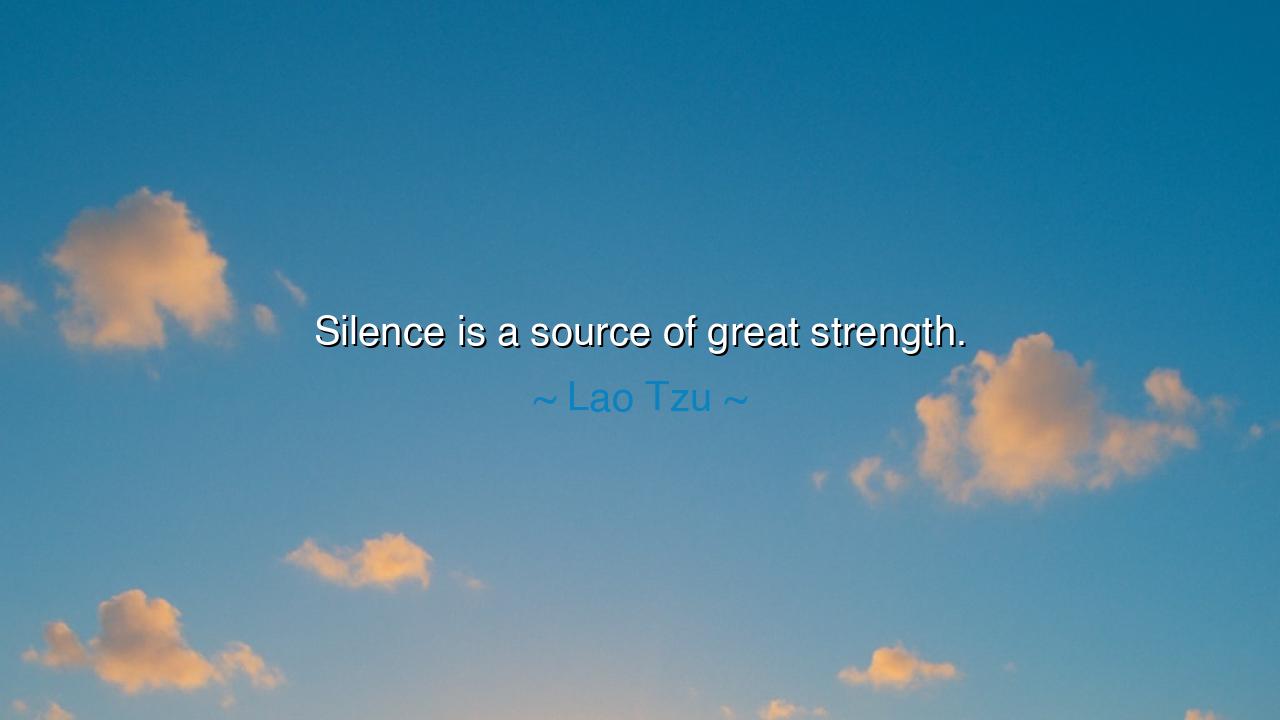
Silence is a source of great strength.






“Silence is a source of great strength.” Thus spoke Lao Tzu, the ancient sage of the Tao, whose wisdom flowed like water—gentle in form, yet mighty in its depth. In this brief utterance lies a truth as enduring as the mountains and as subtle as the breeze: that power does not always roar, and that the greatest force is often hidden within the quiet stillness of the soul. In an age when men shouted to be heard and rulers sought to prove their might through conquest, Lao Tzu taught the opposite—that true strength is not in domination, but in harmony, not in speaking, but in understanding, not in noise, but in silence.
To comprehend his words, one must first understand the Tao, the Way—the ever-flowing order of all things. Lao Tzu taught that the universe itself moves in silence. The stars burn without speech, the rivers carve valleys without boast, and the earth nourishes all life without demand. The Tao works not through conflict but through balance, and the one who aligns with it becomes like water—patient, yielding, yet unstoppable. So too, the human heart finds its greatest power when it is calm, its greatest wisdom when it listens, and its greatest courage when it rests in silence. For silence is not emptiness—it is potential unspoken, the poised arrow before flight, the mountain before the storm.
Throughout the ages, the wise have known that silence is not weakness, but mastery. The warrior who speaks too soon reveals his plan; the leader who argues without listening loses his people. But the one who holds his peace gathers strength from within. Consider Mahatma Gandhi, who once said, “In the attitude of silence, the soul finds the path in a clearer light.” When the world demanded violence, he chose stillness. Through nonviolence and quiet resolve, he moved nations more powerfully than armies ever could. His silence was not inaction—it was the still core around which history itself began to turn. Like the mountain unmoved by wind, his calm defied empires.
Even in the realm of the spirit, silence has ever been the door to enlightenment. The Buddha found awakening not through speech, but through stillness beneath the Bodhi tree. He did not conquer suffering by fighting it, but by observing it in silence, allowing truth to arise from within. The mystics of every age—Christian, Sufi, Hindu, and beyond—have known that the divine speaks in the quiet heart, and that the voice of truth is heard only when the clamor of the world subsides. Lao Tzu’s teaching, therefore, is not merely practical—it is sacred. To be silent is to commune with the deepest order of existence, to draw strength from the very stillness that sustains the stars.
Yet the modern mind fears silence. We fill our hours with chatter, our spaces with sound, our thoughts with endless noise. We equate quiet with emptiness, and pause with failure. But this is illusion. For silence is not the absence of life—it is the womb of creation. Every idea, every act, every work of greatness is born from a moment of stillness. Just as the seed germinates in the dark before it blooms in light, so too must the human spirit dwell in quiet if it is to bear fruit. The artist who sits in silent contemplation, the scientist who studies patiently, the leader who listens deeply—all draw upon the same ancient power.
Lao Tzu’s teaching also speaks to self-control, for silence is not merely the absence of speech—it is the mastery of impulse. To remain silent when anger surges, when pride demands to be heard, is the mark of true strength. The one who governs others may be powerful, but the one who governs himself is invincible. When you withhold unnecessary words, you conserve energy; when you withhold rash action, you preserve wisdom. The silence that arises from restraint is not passive—it is discipline, forged by understanding that not every truth must be spoken, nor every battle fought.
So, what lesson shall we carry from the sage’s words? It is this: seek silence, and you will find your power. In moments of turmoil, be still and let clarity arise. In times of anger, close your mouth and open your heart. Each day, withdraw for a time from the world’s clamor, and listen—to your breath, to your thoughts, to the quiet hum of life around you. There, in that stillness, you will touch something vast and timeless. You will find that silence is not your retreat—it is your fortress.
For as Lao Tzu knew, silence is not the opposite of strength—it is its foundation. Words and actions draw from it as rivers from the sea. To live in harmony with the Tao, one must learn to speak less and perceive more, to cease striving and begin listening. In that listening, wisdom blossoms. In that stillness, the spirit awakens. And in that silence, greater than thunder, you will discover the secret power that moves the heavens themselves—the strength that neither shouts nor conquers, but simply is.






AAdministratorAdministrator
Welcome, honored guests. Please leave a comment, we will respond soon